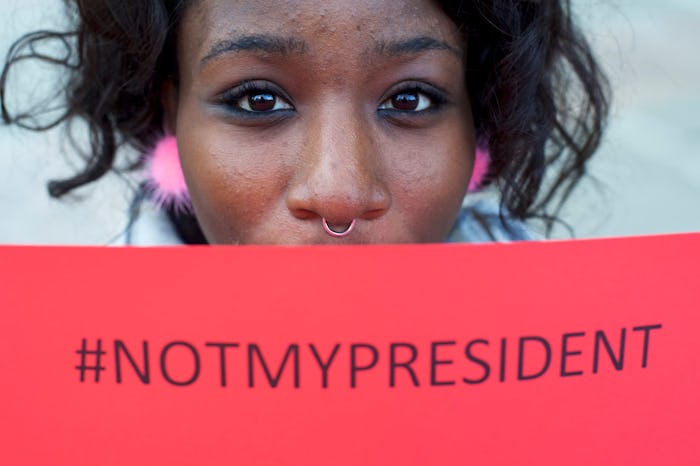News

Donald Trump's Abortion Suggestions Are Full Of Unconstitutional "Undue Burdens" For Women
Since Donald Trump claimed the title of president-elect last week, serious concerns about what his leadership could mean for women's access to reproductive health care have mingled with the protests of the thousands across the country outraged by the election of a KKK-endorsed white nationalist. And in his first major post-race interview, which aired Sunday night, the incoming president did not at all assuage these fears, telling 60 Minutes' Lesley Stahl that he still plans to nominate only anti-abortion judges to the Supreme Court, even if that means that some women will "have to go to another state" to get abortions. There's no doubt that Donald Trump wants to implement "undue burdens" for abortion — a move that the Constitution, as it stands, expressly forbids.
Trump has made no secret of the fact that he aims to overturn Roe v. Wade, the landmark Supreme Court decision of 1973 that ensures a woman's right to choose whether to end her pregnancy in all 50 states. And until last week, when Trump turned out a stunning, widely unexpected victory over Hillary Clinton, and Republicans harnessed control over both the House and the Senate, the right to choose seemed relatively safe.
But now, the man who during the campaign said that women who seek abortions should be punished (before walking back on that amid blowback) will be joined in the White House by vice-president elect Mike Pence, who believes Roe v. Wade should be "consigned to the ash heap of history" and who introduced legislation that would require women to have funerals for their aborted fetuses as governor in his home state of Indiana.
This all spells disaster for women's bodily autonomy and reproductive freedom. Especially troubling is Trump's almost lackadaisical, making-it-up-as-he-goes demeanor and attitude during the pre-recorded interview. He insists that, if he's able to change the makeup of the Supreme Court so that it leans further right and ultimately votes to abolish Roe, decision-making power in the matter will return to individual states. "But then some women won't be able to get an abortion," Stahl replied. Trump responded:
Yeah, well, they'll perhaps have to go — they'll have to go to another state. ...We'll see what happens — it's got a long way to go, just so you understand. That has a long, long way to go.
Forcing women to cross state lines to access a safe and legal abortion falls squarely into the category of "undue burden," or an unnecessary restriction on access to abortion that the Supreme Court ruled illegal in 1992's Planned Parenthood v. Casey. This expectation would be especially devastating and unattainable for young and poor women without the means or time off of work to travel for the procedure.
Still, the fact that the Court upheld these protections as recently as June, when it ruled a restrictive Texas law that had shut down many of the abortions clinics in the state unconstitutional, may not stop Trump — and that's the most terrifying part. There's a very real possibility that he could appoint up to four new justices to the Supreme Court during his term, as there is already one longstanding vacancy and three liberal-leaning justices who are 78 and older.
And if the Trump administration truly is successful in remanding the issue of abortion to the states, is will mean only that opponents of choice will continue to push legislation that is already making the procedure harder and harder to access. Abortions performed past an arbitrary 20-week cutoff date are now illegal in West Virginia and Wisconsin, for example, Scientific American reported.
Kelly Baden, interim senior director of U.S. Policy and Advocacy at the Center for Reproductive Rights, told Scientific American:
We have been in the midst of an avalanche of state-level abortion restrictions for several years now and we unfortunately did not see a huge change in the makeup of the state governors, so I don't expect that to change. Now we're also looking at all three branches of the federal government being controlled by a political party that does not support our reproductive rights. So I think we'll see some emboldening of anti-abortion members of Congress in what they attempt to do at the federal level.
For now, messing with abortion rights at the most basic level is unconstitutional. As the country wades into the treacherous waters of a Trump presidency, it may experience a crumbling of freedom that would rewind progress in women's reproductive justice more than 40 years — a setback that would endanger the lives of women across the country.